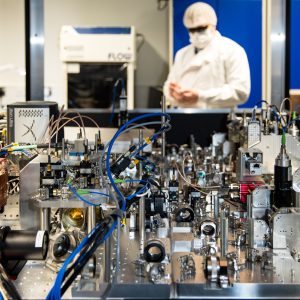
Chipmaker Intel has become the latest big tech company to enter the quantum race with a 12-qubit silicon-based quantum processing unit (QPU). The chip has been named Tunnel Falls and will initially only be available to researchers for experimentation.

Few specific details have been revealed about the actual QPU. It is a silicon spin chip that is machined using Intel’s existing transistor industrial fabrication capabilities. This, says the company, will allow it to scale more quickly as the hardware advances, as it could potentially be produced utilising existing production lines.
The news came as Intel announced plans for a new $4.6bn production factory in Poland.
Quantum dot technology
Intel’s approach is based on quantum dot technology. Tiny CMOS-based silicon quantum dots work like a transistor, when you apply a potential, current flows through the device. Intel says it fabs an array of these dots and creates pockets of electrons which can have a spin up or spin down. The spins of the electrons become the zero and one of the qubit which is then used to encode information.
The company has resisted calls to share any metrics or performance information from the QPU, leaving it instead to its partner research institutions to publish information after testing and benchmarking. “We wouldn’t be working on this technology if it wasn’t competitive now and didn’t have the hope of being the best one in the future,” declared Intel Labs head of quantum Jim Clarke.
Tunnel Falls is the follow-up to the first generation of Intel silicon spin QPUs known as Horse Ridge. The company has been focusing on advancing wafer-scale testing of the chips and improving yield. “Tunnel Falls is Intel’s most advanced silicon spin qubit chip to date and draws upon the company’s decades of transistor design and manufacturing expertise,” said Clarke.
It is produced at Intel’s R&D fabrication plant in Oregon and sits on a 30mm wafer. Unlike classical computers, to operate it has to be cooled to just above absolute zero, at 1.6 Kelvin, or -271 Celsius.
Intel’s quantum long-term planning
Intel says it doesn’t see any commercial advantage for quantum machines in the near future. Its focus is building a research ecosystem for when the hardware is ready. “The next major ‘quantum leap’ is probably five years away, when we have a few thousand qubits and can essentially create a logical qubit,” explained Clarke. “But even then, more than one logical qubit will be needed to do something commercially relevant.”
This isn’t a new approach for Intel. The company has long held the view that quantum computing won’t hold any significant advantage during the current noisy, error-prone era of physical qubits. It also believes that the best way to scale is by leveraging existing systems used for CPUs and silicon-based hardware, which is perhaps no surprise given its heavy investment and long history in this sector.
This runs counter to the approach seen from IBM and a plethora of quantum hardware start-ups where the focus has shifted to improving error mitigation and correction. IBM recently announced it had achieved “quantum utility” through hunting down errors faster than they appear. This led to its Eagle QPU outperforming a classical supercomputer.
To achieve its goal of “democratising silicon spin qubits” and compete with more established technologies like superconducting, photonic and trapped-ion, Intel has partnered with the US Department of Defense’s national quantum research centres – the LPS Qubit Collaboratory. This will include giving researchers hands-on access to the current and future generation QPUs but then leaving it up to the institutions to set up systems and infrastructure to utilise them.
Is Intel too late to the quantum party?
Clarke says improvements are happening weekly to the chip, with the next generation likely released in 2024, although hasn’t shared any specifics on what it might be called or how many qubits are likely to be possible on the single wafer.
Maria Maragkou, VP of product at quantum engineering company Riverlane, told Tech Monitor it was a “good step forward from Intel” and that assuming the qubits are usable it “would be the largest spin qubit offering so far”. She adds: “It is encouraging seeing the silicon qubits catching up with other more advanced platforms.”
But Intel will face the same scaling challenges as those other more advanced platforms, Maragkou explained, so “the race is far from over” to be the first platform to reach utility scale. “It’s impossible to predict at the moment which architecture will be the one to scale successfully,” she says. “The reason this ecosystem moves so quickly is because both big tech companies and start-ups are mobilised to deliver solutions that push the field forward.”
Maragkou says the true value of quantum will require an ecosystem of hardware, operating system and algorithms before the “true potential of quantum computing will be unlocked.”
Intel announces $4.6m Poland factory
Meanwhile, Intel is continuing to invest in leading-edge silicon chips for classical computers, and today said it plans to build a new assembly and testing facility in Poland at a cost of $4.6bn. The factory is due to be operational by 2027 and will create 2,000 new jobs.
Intel says its planned investment in Poland, combined with its existing wafer fabrication facility in Leixlip, Ireland, and its planned chip fab in Magdeburg, Germany, will help create “a first-of-its-kind end-to-end leading-edge semiconductor manufacturing value chain in Europe”. It could also serve as a catalyst for additional ecosystem investments and innovation in Poland and across the EU.
“Poland is already home to Intel operations and is well positioned to work with Intel sites in Germany and Ireland. It is also very cost-competitive with other manufacturing locations globally and offers a great talent base that we are excited to help to grow,” said Intel CEO Pat Gelsinger. “We’re grateful for the support from Poland as we work to grow the local semiconductor ecosystem and contribute to the EU’s goal of creating a more resilient and sustainable semiconductor supply chain.”






